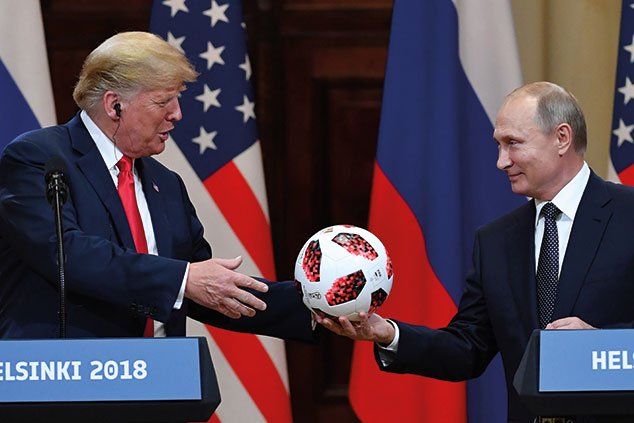
The president’s party puts up with a lot – but cosying up to Putin was too much.
“After 17 months, three weeks and six days of Donald Trump’s tumultuous presidency, some of his fellow Republicans had finally had enough,” says Peter Baker in The New York Times. The extraordinary press conference in Helsinki with Vladimir Putin, in which Trump stated that he didn’t “see any reason” why Russia should be behind US election interference, suggested that the US president had chosen to take the word of Russia’s strongman over that of his own intelligence agencies. The remarks drew unprecedented criticism from the political right, with former Republican House Speaker Newt Gingrich saying that it was “the most serious mistake of his presidency”.
Trump’s summit with Putin was “a personal and national embarrassment”, says The Wall Street Journal. Putin respects strength, but Trump’s performance amounted to a “kowtow” that will allow Moscow to consolidate its strategic gains in Ukraine and Syria, where Russian-backed forces occupy large areas of territory. The president’s constant criticism of Nato risks undermining support for the organisation in the United States, opening the way for the Russian dictator to try to “pull another Crimea” in one of the Baltic states. His description of the EU as a “foe” is stoking resentments that may come back to bite him, while his shoddy treatment of Theresa May will lead many to conclude that “working with Trump is more perilous than fighting him”.
Trump was initially defiant following his comments about election hacking. However, with most of the usual Trump surrogates declining to defend him on news networks, the president was forced into a rare retreat, retracting his statement the following day by claiming he misspoke. “The sentence should have been: I don’t see any reason why it wouldn’t be Russia… I said the word ‘would’ instead of ‘wouldn’t,” Trump rather implausibly claimed after returning to Washington.
The muck won’t stick
Expect normal service to resume shortly, says Rob Crilly in The Daily Telegraph. Trump is a man “to whom muck never clings”. We have gone from the “Access Hollywood” scandal – the release of a tape of him making lewd remarks while recording a TV show – to Charlottesville and his failure to condemn white supremacists to the administration “locking-up-children-at-the-border-gate” and still his career goes from strength to strength. Trump’s rock-solid support among his base has held up through all of the crises of the last 18 months. Nevertheless, his curiously poodle-like performance in Helsinki has led some “to wonder whether the Russians really do have some kind of kompromat” (compromising material) on Trump.
Yet this isn’t about some “nefarious” Russian plot. It’s about Trump’s “ridiculous ego problem”, says Ben Shapiro in National Review. The president’s ego is a “gaping wound, constantly draining rage over the suggestion that his 2016 election victory was somehow ill-won”. He fired James Comey when the former Federal Bureau of Investigation director wouldn’t clear him of collusion with Russia. Now the Mueller probe’s indictment of 12 Russian agents for hacking Democratic officials in 2016 has him on the ropes again, prompting his later reversed musings in Helsinki.
The truth is that many Americans have begun to “tune Trump out” and foreign leaders could now be doing something similar. Trump raged about Nato allies not pulling their weight last week, but other leaders ignored the rhetorical pyrotechnics, calculating that the administration’s national security establishment isn’t going to allow a US Nato pullout. “When Trump says stuff, it often doesn’t matter.”
Hong Kong continues authoritarian slide
The Hong Kong authorities have moved to ban the Hong Kong National Party, a small group that supports an independent “Republic of Hong Kong”, on the grounds of national security. The party has been given 21 days to justify why it should not be banned.
Hong Kong is guaranteed significant autonomy and civil liberties under the “one country, two systems” agreement signed before the former British territory was handed back to China in 1997. However, recent years have brought growing concern that rights to freedom of speech and association and the rule of law are being eroded. The failure of large-scale protests in 2014, known as the Umbrella Movement, have led some activists down the pro-independence path, says Austin Ramzy in The New York Times.
Yet the two-year-old National Party still claims “at most a few dozen members and no elected lawmakers”. The authorities’ real objective is to stamp out separatist politics before the idea gains momentum, says the South China Morning Post. Local leaders also want to please their masters in Beijing, who are impatient with the territory’s failure to bring in national security laws. Where liberal critics see a freedom of speech issue, Beijing sees the sovereignty question as an immutable “red line”.
The use of a colonial-era law originally developed to deal with triad gangs will have a chilling effect on political activity, says Ben Bland in the FT. Authorities have already used the taboo about independence to bar pro-democracy candidates from standing for office, while other activists have been jailed in the past year for “unlawful assembly”. Claudia Mo, an opposition member of the city’s Legislative Council, says that many who campaign for democracy will feel like “sitting ducks” if the attempt to ban the party proves successful.